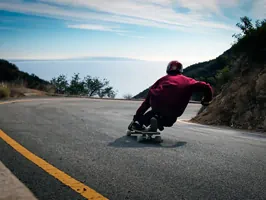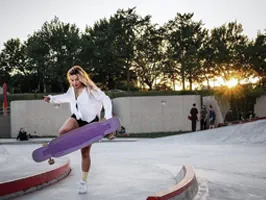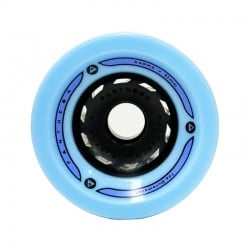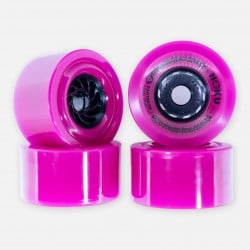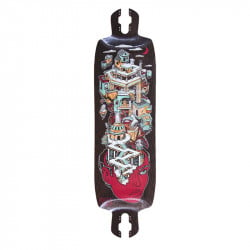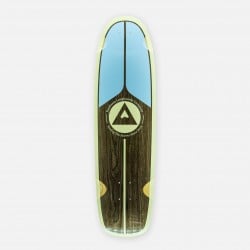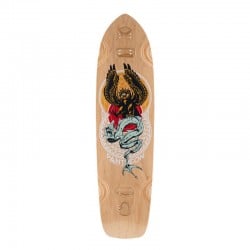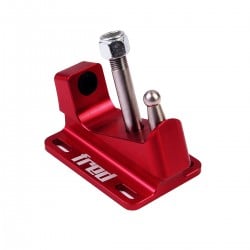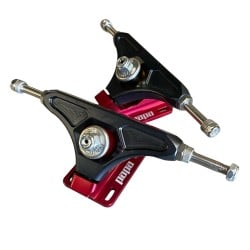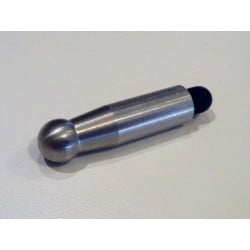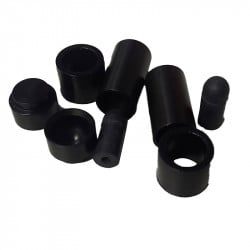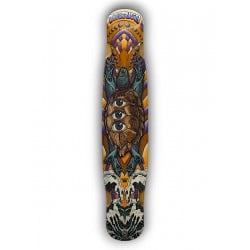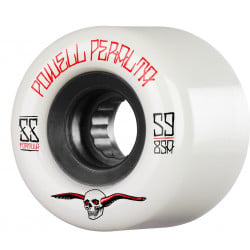-
 Free shirt from € 150,-
Free shirt from € 150,-
-
 Free Parking
Free Parking
-
 Free Shipping starts at € 75,- (NL/BE/D)
Free Shipping starts at € 75,- (NL/BE/D)
-
 100-day return policy
100-day return policy
-
 Worldwide shipping
Worldwide shipping
Buying a Longboard Skateboard (advice) at Sickboards Shop
Type of deck
There are many types of longboards you can buy ranging from stiff downhill decks to flexy cruiser longboard, below we will go through the different shapes, so it is important to know which board you need before you want to buy a longboard.
Pintail
The pintail is a classic shape, back in the day most longboards were pintails, many find it an aesthetic/beautiful shape, but it not the most functional shape. Due to the smaller tail, there is less room for your rear foot, it has an asymmetric shape making it less ideal for cruising as you need to make a turn if you want to go back. Most pintails are top-mounted, resulting in a higher standing platform, this is not desirable because you have to bend your front knee more than when you are lower to the ground, so it will cost more energy to push.
Topmount (no kick, single kick, double kick)
With the truck under the board, possibly with a riser to avoid wheel bite, the deck is a bit more responsive compared to dropped/drop through models, that is the reason that these boards are generally used for downhill, (fast) freeriding and sliding. The kicks can be used during sliding or for ollieing the board. Whether you need or want that is entirely up to you.
Drop through
Drop through means that the trucks are mounted through the board, resulting in a board that is a bit lower to the ground, making it easier to push. They are generally symmetrical, so there is no rear front or back, so you can just jump on the board without thinking about which direction you are going. A flex board provides a smooth ride, as it absorbs a lot of vibrations and when you carve hard you can put energy into the board in the turn which is returned when you come out of it. The platform is optimized for maximum space for the feet, so you can do some cross-stepping if you want. Some, like the Loaded Dervish Sama, have small kicks so you can even do some tricks, making it a super all-round board.
Dropped /Double Dropped
Dropped (lowered middle platform) and Double Dropped (both drop through and dropped) have a super low platform, ideal for pushing because you can almost don't have to bend the front knee, making pushing almost effortless. With the right trucks, one can mount very large wheels (up to 107mm in diameter) without having to worry about wheel bite. These boards were initially designed for downhill because of the lowered center of gravity, but are embraced by the pushing community an ideal board for distance and transportation.
Dancer
Dancers are the longest boards in the longboard family, they are top-mounted and the board generally covers the wheels, so that when you do a trick there is less chance of you stepping on your wheels. The long platform allows for a lot of walking and rotating on the board (cross-stepping, peter-pan, body varials etc.). The longer board also makes it easier to grab your board when doing a trick like a tiger claw.
Plastic / Mini Cruiser
The mini cruisers are generally the size of a street skateboard but are shaped, meaning they have a distinct nose and (kick)tail. This in combination with softer wheels and nice steering trucks, making it an ideal board for cruising around town. Perfect for when you have to park your car somewhere on the outskirts of town and instead of walking the last part you can skate. The plastic (Penny) boards are generally narrower than their wooden cousins, so more tailored towards people with smaller feet, but still, fun board to cruise around on.
Flex vs stiff
This is a personal preference, more flex will give more comfort during the ride and a stiffer board will give more control & stability.
Disciplines
Within longboarding, there are many disciplines, all with their own specific boards and setups.
Downhill/Freeriding
Speeding down the mountain, reaching speeds up to 135km/u. This is generally down on events where there the road is closed from traffic and there are hail bails protecting dangerous obstacles, and an ambulance standing by in case of emergency. Sometimes this is done in a competition (for instance IDF/IGSA or REB/DDF) or just for fun. Well-known events in Europe are Wallonhill, KnK, Belajoy ride (for all events check out freerides.org). When downhill skating the object is to be down the fastest, freeriding is more doing fun pack runs and big (standup) slides.
Downhill boards are preferably mounted with precision trucks, generally with a lower than the standard 50-degree baseplate, sometimes with a split angle setup (a lower angled for the rear truck to increase stability at higher speeds). The wheels are soft (mostly 76A-80A), square-lipped wheels with a diameter around 75mm for a high top speed and tonnes of grip in the corners. Last but not least high-quality bearings as these can become very hot due to the fast spinning wheels, and if they become too hot they can explode or melt the core of the wheel.
Dancing/Freestyle
Dancing is quite popular in flat countries because that is the ideal surface to practice the tricks, while the dancing originates from longboard surfing, has freestyle its roots in street skating. The combination of the two creates a beautiful blend of gracious and technical trick and routines.
Boards are anywhere between 100 and 160cm long, with nice big kicks. All parts of the equipment can suffer quite a bit from the impacts (especially when doing freestyle tricks), so it needs to be strong enough to withstand a beating. Forged trucks are stronger than normal (cast) trucks and will remain straight, in combination with soft bushings which allow for easy turning and fast rail to rail action.
Cruising
Skating is better than walking, so if you want a board that is easy to use, chill to ride go for a flex drop-through board with nice big (around 70-75mm) soft (around 80a) wheels. You can skate over most surfaces, whether is it asphalt or tiles, and the occasional twig, smooth cruising. If you need a board the is easy to carry you might consider a landyachtzDignhy or sorts.
Carving / Surfskate
If you are looking for that surfy feeling when there are no waves, the Carvers are the board of choice. With their specially designed trucks, they can deliver the ultimate surf the streets feel. The front truck has a lot of steering capabilities allowing you to propel yourselves forward with a pumping/carving motion, but you can also mimic bottom turns and snappy cutbacks or floaters. A must-have for any surfer.
Sliding
The art of going sideways. Whereas in snowboarding sliding is the first thing you will learn, in longboarding it is something for the more advanced skater. It is advisable to wear proper protection when practicing this (slide gloves, helmet, knee, and elbow pads). Basically there are two types of sliding, hands down, here you reduce the pressure on and the grip of the wheels by putting your hand(s) on the road when initiating the slide. This is generally seen as the easiest way to slide because is it not scary and if you fall you won't fall too hard (in most cases). The other method is stand-up sliding, similar to snowboarding), where you initiate a carve and let the wheels break traction.
Most people use a medium sided board, top-mount, with slide wheels. Harder (>85a) wheels used to be the go-to wheel, but with the advances of the urethane, softer wheels (around 80a) are now more popular. The reason being is that they provide more control during the slide, and some leave nice thane lines when sliding. Good beginner wheels don't thane too much because the downside of thaning wheels is that they tend to flatspot way easier. Once you master your slides you can go for a more thanier wheel.
LPD
Long Distance Pushing / Pumping, covering great distances on your board. Although the goal and acronym are the same the boards can be quite different. Pushers are generally (double) dropped boards, low to the ground and big fast wheels (like the Speed Vents, Flywheels or Kegels). The trucks are most often TKP (traditional kingpin/indy style) trucks. Pumping can be done either on a top mount board with a pump set up or on a special LDP board like a G-Bomb with brackets, which can be used for both pushing and pumping.
Slalom
The object of the games is to maneuver through the cones as fast as possible without hitting them. Special stiff boards with super agile trucks provide the ability to change the direction swiftly and gain speed by pumping. Generally done on a slightly sloped course with a start ramp. Professional Slalom skaters are members of the ISSA
Luge / Buttboarding
Not really longboarding, but closely related. Originated from people laying down on their skateboard, it grew into two disciplines. Classic Luge / Buttboarding in which you have a wooden deck, 2 trucks, 4 wheels and no support for your feet and street luge often made of metal, where you can have 2,3 or 4 trucks support for your feet if desired. Generally, the street luges go a bit faster than classic luge but have a higher price tag.
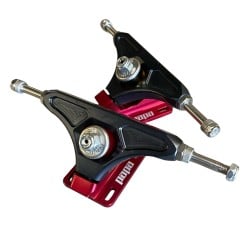 -5%
-5%
Ronin Billet Katanas 144/154 Precision Truck Set - Scratch - Black/Red
- Reduced price
- New

